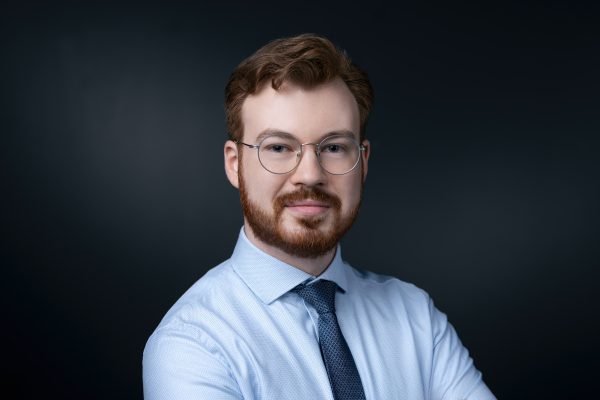
Vytenis Fuks
IIRPS PhD candidate
You graduated from the Institute with a Bachelor’s degree in Political Science and a Master’s degree in Public Policy Analysis. How did you decide to start your academic journey at IIRPS VU?
It was a quick and relatively easy decision. I made my decision in the eleventh-grade of gymnasium. There was a presentation of IIRPS at school and that’s when I first heard about IIRPS and immediately decided that I would study there. I was an active member of youth organisations, the school community and interested in politics, so it seemed like a natural path. I have not regretted this decision. Sometimes I thought maybe I should have tried my hand in another field, but most of the time my thoughts ended up with the conclusion that I couldn’t imagine myself anywhere else.
You opened the doors of the Institute in 2017, what is the most memorable event from your studies at IIRPS VU?
Probably the most memorable event happened in the first year – I had to help organise a rally in support of IIRPS (as we called it – anti-miting) under the windows of the institute when a certain political group was making strange demands on IIRPS and the university in general, and labelling us as a Communist university. There were more nuances to this event, but let’s leave that to history. In any case, it is fun to remember how we drew witty posters and had heated discussions with the participants of another rally.
You are currently a PhD student at the Institute and are working on your thesis on the impact of multiple crises on public governance and their horizontal management. Why did you choose this topic? Do you have any insights on this topic already?
During my studies, the topics that most often attracted my attention were focused on Lithuanian grievances, and quite often on education. I was interested in the peculiarities of the choice of political youth organisations, attempted to analyse the Lithuanian education system, examined the problems of optimising the school network, and explored the peripeteia of the reform of the healthcare system. In other words, I tackled topics that I thought were not only interesting, but that could also lead to practical results in improving public governance. This is the main reason why I decided to pursue my academic career as a PhD student and to choose the study of public governance in the face of multiple crises – I hope that the results of my thesis will not only contribute to the already existing knowledge base, but also provide additional tools for decision-makers in the future management of crises.
This is a new area of research, and so far the term ‘multidimensional crisis’ is mostly applied to global crises, so it will be an interesting academic challenge to explain why this is also relevant at national level. I can’t give too many insights yet, but for the EGPA conference, Professor Vitalis Nakrošis and I have been working on Lithuania’s response to the Covid-19 crisis and the crisis of illegal migration from Belarus. Preliminary results of the study show that simultaneous crises are forcing institutions to change their crisis management mechanisms, and the centralisation of crisis management is taking place.
You are one of the founders of the themed summer camp for children “Svajonė”, can you tell us more about it? How did you come up with the idea? How does working with children help you to develop as a person?
I used to go to camps as a child and in my early teens, and this experience remains one of my fondest summer memories. The camp experience went beyond the simple company of friends; it created a unique world with its legends, games, and traditions – you get away from the world and just enjoy the rest. I wanted to create this magic for others. That’s why I’ve worked and contributed to other camps over the years and last year we started with our own camp. For me, it’s still an escape from the everyday worries of the outside world. It’s a place of relaxation, nature, and good memories, completely separated from work and studies.
What does your free time look like after work, studies, and other initiatives?
There is not much free time, but whenever we have the opportunity, we go to nature with my fiancée and our dog, and we like to go hiking. We also try to go to dance classes every week – we tried it at first because it was just interesting, but we got into a very friendly group, so for over a year now we’ve been dancing classical and Latin American dances every now and then.
What would you like to wish the IIRPS VU community?
To find the perfect answer to the most popular question of my relatives – “So what are you going to be when you graduate from university?”.







